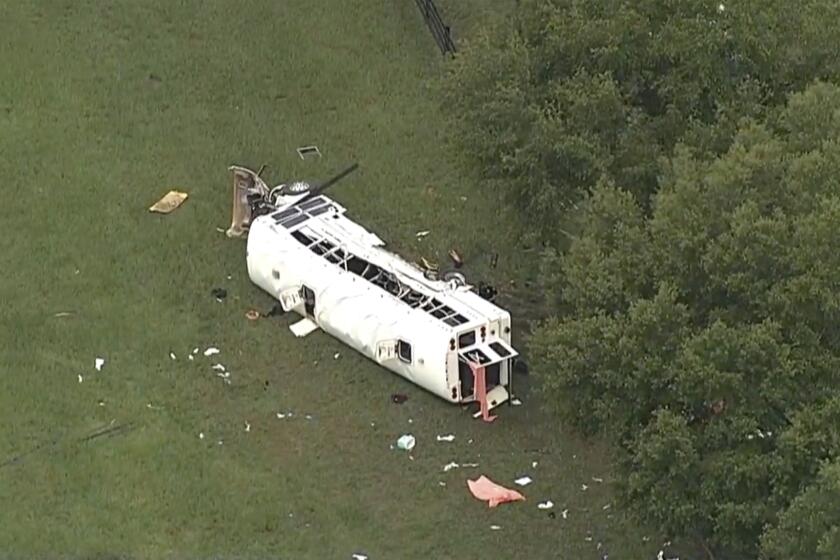INS on Long Slide Before Visa Fiasco
When James Ziglar took over the Immigration and Naturalization Service last year, he knew the agency stood as an epitome of a clunky, old-fashioned, mistake-prone bureaucracy.
The INS had become legendary for admitting terrorists and other criminals into the United States, losing track of people it wanted to deport and failing to control a population of illegal immigrants that has soared to 8 million. Ziglar had no illusions that he could “turn it around tomorrow and streamline it and make everything hunky-dory.”
Yet nothing could have prepared the former financial executive and high-ranking Senate staffer for last week’s revelation. On Monday, exactly six months since the Sept. 11 terrorist attacks on the World Trade Center and the Pentagon, the INS notified a Florida flight school that the two men who had piloted hijacked jetliners into the World Trade Center had been granted legal status to study in the United States.
“The truth is, the INS is beyond reform. It needs to be rebuilt from scratch,” said Rep. Jeff Flake (R-Ariz.), expressing an increasingly common view.
How did the INS get so bad? The answer has much to do with the agency’s rapid and rocky transformation since the 1970s from a Justice Department backwater to a high-profile bureaucratic behemoth with conflicting but politically sensitive tasks: helping some foreigners enter and remain in the country, while keeping others out.
The Bush administration plans to divide the agency into separate enforcement and service wings to address that conflict. Some in Congress would like to abolish the INS, distributing its duties to other agencies.
The role of the INS expanded as the nation began to absorb a completely unanticipated wave of new arrivals--legal and illegal--who would become the largest sustained group of immigrants in U.S. history.
Congress piled new tasks and responsibilities onto the INS even though the agency already fell short of expectations. Yet Congress rarely gave the agency its full attention, much less the resources it needed.
More fundamentally, the public was ambivalent about the INS and its role in an open society. Officials demanded thorough yet speedy inspections of incoming airline passengers.
“We need an agency that can better enforce the laws, but we need laws that can better be enforced,” said Frank Sharry, executive director of the National Immigration Forum, a pro-immigration group in Washington.
Justice Department supervisors regarded the agency warily as its annual budget burgeoned toward $6 billion and employee ranks shot past 30,000.
“The INS has been a stepchild of the Justice Department for so long that now, when it’s being asked to do more, it’s hard to jump over the hurdle,” said Stephen Yale-Loehr, who teaches at Cornell Law School. “The INS today has a mission that is going to land it on the front page no matter what it does. It’s harder to ignore its failings and harder to ignore its failure to overcome its failings.”
The INS has remained locked in a mentality more suitable to the 1950s than the global economy of 2002. Even today, the system for tracking the arrival of foreign air travelers is based on a paper coupon that travelers are supposed to fill out and airlines are supposed to turn over to U.S. authorities.
The INS culture also has been slow to embrace the concept of customer service. Border Patrol officers are trained to arrest people, not help them with their paperwork.
The chaos at the agency so lowered morale that an outsider could easily sense it after spending any amount of time with line agents or inspectors.
“The FBI culture is, ‘We’re smart, we’re strong, we’re good,’ ” Sharry said. “The INS culture is, ‘We’re bad, we screw up, and everybody kicks us around--even though we’ve got a lot of talented people.’ ”
That has led to high turnover. Today, as the Federal Aviation Administration gears up to hire more sky marshals, INS officers are among the largest pools of applicants.
“If an agency is not well run, the people who are smarter or better are more likely to jump ship,” Yale-Loehr said.
The INS is not the only federal agency to make high-profile mistakes.
But it would be difficult to imagine a president dismissing any other agency with the scorn that President Bush readily heaped upon the INS on Wednesday, when he said that “I could barely get my coffee down,” after hearing of the flight school letters.
Four high-level INS managers were shuffled into new positions Friday in the wake of the embarrassment, including the acting deputy chief for the Border Patrol and the regional director for the Western region. The shake-up followed what Ziglar called a “breakdown in communication.” He said the changes were aimed at improving accountability in the agency.
The lack of respect for the INS may have something to do with its core clientele: immigrants. Except for naturalized citizens, they are disenfranchised. “The INS is a convenient whipping boy because its primary constituency doesn’t vote,” said Rick Swartz, a veteran immigrants rights advocate in Washington.
This has allowed for consistently deplorable service--long waits and rude treatment--that most U.S. citizens would not tolerate. “I feel like I’m back in the Third World,” an exhausted Jorge Custodio said at the end of a 13-hour vigil outside the Los Angeles office last year as he and hundreds of others waited to file papers to make one of the agency’s ever-shifting deadlines.
The blame can’t be pinned on the agency alone. The INS often is ill-equipped to carry out pet projects ordered up without due deliberation by the Justice Department or the White House. Witness the case of Citizenship USA, a Clinton administration plan to boost citizenship totals in 1995 and 1996.
Applications for citizenship more than tripled. World War II-era records for swear-ins of new citizens were shattered. But Republicans alleged a partisan plot, likening the Clinton-Gore team to Tammany Hall operatives rounding up immigrants at the docks a century earlier. The GOP accusation was not proved, but revelations that thousands became citizens without complete background checks derailed the initiative and caused massive new delays.
On a visit to the L.A. office in the late 1990s, INS Commissioner Doris Meissner saw the results: tens of thousands of manila folders containing citizenship applications that had been gathering dust for as long as several years. “This,” she said, “this is the black hole.”
Congress has mirrored the public in its conflicting expectations of the agency.
Before Sept. 11, lawmakers backed away when U.S. colleges and universities resisted making the student visa system more intrusive than it already was. Congress also bowed when commercial interests fearing a traffic slow-down balked at an attempt to record exits from the United States--a crucial way to keep track of foreign visitors. Sept. 11 exposed these regulatory gaps, and opposition to closing them has crumbled.
Congress also has directed the great bulk of INS enforcement resources toward the Southwest border. That left little room for finding illegal immigrants elsewhere or to keep a careful eye on the northern border with Canada, where authorities are especially fearful of terrorist infiltration.
“Congress routinely increases the workload of the INS, but doesn’t provide the added manpower and resources necessary,” said Steven Camarota, director of research for the Center for Immigration Studies, which favors cuts in new arrivals. “The INS has all these huge structural problems, but the criticism tends to be manifested in these spectacular gaffes. The real debate should be: Are we giving the agency too much to do?”
Just last week, the House passed a bill that would require the INS to review tens of thousands of new applications from lawful residents seeking legal status for close relatives.
Seemingly minor legislative demands can have major ripple effects on the agency’s overall performance, former officials said.
David A. Martin, INS general counsel in the 1990s, recalled how in 1996 Congress passed tough restrictions on foreigners seeking political asylum. Then in 1997, it created a special exemption for Nicaraguans and Cubans, while subjecting asylum-seekers from El Salvador and Guatemala to different guidelines. The INS had to train and retrain personnel to meet those complex and overlapping provisions, which affected only a fraction of a case backlog now approaching 5 million.
“The pace is unbelievable, and the demands come fast and furious,” Martin said. “It’s hard for people at the top to focus on fixing things. . . . The business of regulating migration is just a lot more complicated than people think, and allowances have to be made for that.”
Since Sept. 11, experts say, the INS has made some progress in dealing with its daunting challenges. It is moving forward with plans to modernize the student visa system and to use the FBI data base to catch those who have fled deportation proceedings.
Most agree that part of the solution is to separate the agency’s law-enforcement function from routine services. That is a theme of the administration plan and a more drastic overhaul sought by Rep. James F. Sensenbrenner Jr. (R-Wis.), chairman of the House Judiciary Committee, whose proposal comes close to breaking up the agency.
Yet some warn that history may offer a lesson: At the INS, highly ballyhooed reforms have a way of backfiring. Indeed, the letters sent to the flight school last week originated at a privately run operations center once touted as an innovation that would improve service to immigrants.
Given such a background, some warn against putting too much distance between the agency’s service and law-enforcement roles. Closer coordination between those two functions, Martin argues, might have saved the INS from its newest embarrassment.
“I marvel sometimes,” the former INS chief counsel said, “that people don’t recognize that their prescription is a poor match for the disease.”
More to Read
Start your day right
Sign up for Essential California for news, features and recommendations from the L.A. Times and beyond in your inbox six days a week.
You may occasionally receive promotional content from the Los Angeles Times.






